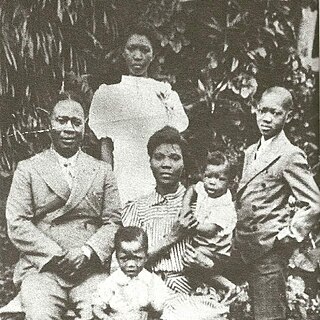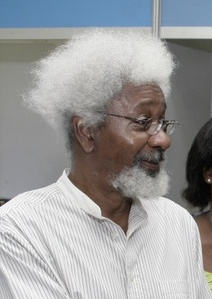
Akinwande Oluwole Babatunde Soyinka Hon. FRSL, known as Wole Soyinka, is a Nigerian playwright, novelist, poet, and essayist in the English language. He was awarded the 1986 Nobel Prize in Literature for his "wide cultural perspective and... poetic overtones fashioning the drama of existence", the first sub-Saharan African to be honoured in that category.
Irreligion is the absence or rejection of religious beliefs or practices. It encompasses a wide range of viewpoints drawn from various philosophical and intellectual perspectives, including atheism, agnosticism, skepticism, rationalism, and secularism. These perspectives can vary, with individuals who identify as irreligious holding a diverse array of specific beliefs about religion or its role in their lives.

Augustus Taiwo "Tai" Solarin was a Nigerian educator and author. He established the famous Mayflower School, Ikenne, Ogun State in 1956. In 1952, Solarin became the principal of Molusi College, Ijebu Igbo, a post he held till 1956 when he became the proprietor and principal of Mayflower School.

Oluseun Anikulapo Kuti, popularly known Seun Kuti, is a Nigerian musician, singer and the youngest son of Afrobeat pioneer Fela Kuti. Seun leads his father's former band Egypt 80.

The Ransome-Kuti family is a Nigerian Yoruba political family noted for its simultaneous contributions to art, religion, education and medicine. It belongs to the Nigerian bourgeoisie, and also has historic links to the Nigerian chieftaincy system.
Irreligion in the Czech Republic pertains to atheism, agnosticism, and lack of religious affiliation in the Czech Republic. The history of irreligion in the Czech Republic dates back to 19th century freethought and saw additional developments during Communist rule. A majority of people in the Czech Republic are irreligious or otherwise unaffiliated, and the country is considered to be one of the most irreligious in the world.
Irreligion is present among a minority of mainly young people in Pakistan. Atheists in Pakistan face discrimination, persecution, and prejudice in society. Pakistan is reported by some sources to be among the thirteen countries where atheism can attract capital punishment, but according to the Library of Congress of the United States, "there is no specific statutory law that criminalizes apostasy in Pakistan." On the other hand, the Pakistani government can impose the death penalty for blasphemy.
Irreligion, according to the South African National Census of 2001, accounts for the beliefs of 15.1% of people in South Africa, the majority of those being White.
Irreligion in Iraq has a societal, political and historical background. Although the Constitution of Iraq guarantees freedom from religious coercion, and states that all citizens are equal before the law without regard to religion, sect, or belief, irreligious people may encounter difficulties with the authorities. Another source of problem is usually the community and family, with reactions varying from one family to another. The “Global Index of Religiosity and Atheism” listed Iraq as one of six countries as having the lowest rate of atheism in 2012. After six years, with religious figures coming to power, the situation changed rapidly as the tide of religiosity receded. According to various Iraqi thinkers, this occurred after the religious politicians came to power, and their role in sectarianism and state corruption, and by regularly occupying television slots to spread their agendas. The increasing prevalence of atheism and agnosticism signals a tidal public opinion change.

Irreligion in Bulgaria pertains to atheism, agnosticism, and secularism among the citizens of Bulgaria. Irreligion is a minority religious position in Bulgaria. Making up approximately 5-10% of Bulgarians, irreligion is the second most common religious stance after Eastern Orthodoxy. Irreligion in Bulgaria is closely tied to the history of Marxism–Leninism and Soviet rule in the country during the 20th century.
Irreligion in Iran has a long historical background, but is difficult to measure, as those who profess atheism are at risk of arbitrary detention, torture, and the death penalty. Non-religious citizens are officially unrecognized by the Iranian government. In the official 2011 census, 265,899 persons did not state any religion. Between 2017 and 2022, the World Values Survey found that 1.3% of Iranians identified as atheists, and a further 14.3% as not religious. In the 1999-2004 cycle, the WVS had found 1% identified as atheist and 3% as not religious.

Irreligion in Nigeria is measured at less than one percent of the population. As in many parts of Africa, there is a great amount of stigma attached to being an atheist in addition to institutionalized discrimination that leads to treatment as "second-class citizens."
Irreligion in the Middle East is the lack of religion in the Middle East. Though atheists in the Middle East are rarely public about their lack of belief, as they are persecuted in many countries where they are classified as terrorists, there are some atheist organizations in the Middle East. Islam dominates public and private life in most Middle East countries. Nonetheless, there reside small numbers of irreligious individuals within those countries who often face serious formal and, in some cases, informal legal and social consequences.
Irreligion in Latin America refers to various types of irreligion, including atheism, agnosticism, deism, secular humanism, secularism and non-religious. According to a Pew Research Center survey from 2014, 8% of the population is not affiliated with a religion. According to Latinobarómetro, the share of irreligious people in Latin America quadrupled between 1996 and 2020, from 4% to 16%.
Irreligion in Romania is rare. Romania is one of the most religious countries in Europe, with 92% of people saying that they believe in God. Levels of Irreligion are much lower than in most other European countries and are among the lowest in the world. At the 2011 census, only 0.11% of the population declared itself atheist, up from the 2002 census, while 0.10% do not belong to any religion. While still one of the most religious countries in Europe, practicing, church and mass attendance is quite low, even compared to some less religious countries than Romania. It is mainly practiced by elderly people, mainly in rural areas, while in urban areas church attendance and practice is much lower. As of 2021, almost 85% are declared religious, of which about 73% are declared orthodox, 12% other religions, about 1% atheists or irreligious and about 14% declared nothing about religion.

Irreligion in Croatia pertains to atheism, agnosticism, and lack of religious affiliation in Croatia. Even though the 2011 census showed that only 4.57% of Croats considered themselves irreligious, Gallup polls conducted in 2007 and 2008 found that 30.5% of respondents did not consider religion important in their lives. The Japanese research center, Dentsu, conducted a survey in 2006 concluding that 13.2% of Croats declare themselves irreligious, compared to the 7% found by a 2010 Eurobarometer survey across Europe.

Grace Eniola Soyinka was a Nigerian shopkeeper, activist, and member of the aristocratic Ransome-Kuti family.
Irreligion in Montenegro refers in its narrowest sense to agnosticism, atheism, secular humanism, and general secularism. Increase of the number of irreligious people is usually interpreted by the modernization marked with tendency of secularization and the progress of science and technology that directly affect human society.
Irreligion in Latvia pertains to atheism, agnosticism, and lack of religious affiliation in Latvia. Irreligious thought in Latvian history is associated with national identity and a period of Communist rule. The irreligious make up a significant minority group in Latvia today, with 29% of Latvians identifying as irreligious.
Irreligion in Lithuania pertains to atheism, agnosticism, and lack of religious affiliation in Lithuania. Irreligious Lithuanians make up a small minority of the population, encompassing only 6.11% of the population in the Lithuanian census of 2021. Irreligion in Lithuania is associated with the period of Soviet rule in the late 20th century.









